Police investigation is an important part of justice delivery system and the court judgments are largely dependent on the evidence submitted by the police. NCRB data from 2018 indicates that police filed the closure report in more than 23% of the cases citing lack of evidence.
Proper investigation of the crime and disposal of the case either through closure or transfer to courts for a trial is one of the prime responsibilities of the police. Delay in the investigation & filing charge sheet delays the entire trial process. The common notion amongst the public is that the police delays investigation in most cases. What does NCRB data say about the disposal of cases by the police? Here is an analysis based on the 2018 ‘Crime in India’ report of the NCRB.
What happens after a case is filed?
Any case that is filed with the police is investigated and further action depends on the outcome of that investigation. The cases are either disposed of by police or continue to be pending with them (under investigation).
The disposal of a case by the police includes either closure of the case by filing a final report or by filing a charge sheet. All such charge-sheeted cases go to the courts for trial. The ones that are not disposed are still pending for investigation with the police.
While pendency of cases in the courts is often considered to be a stumbling block in timely delivery of justice, there are multiple stages that a case has to pass through with the police before the trial in the courts. In this story, we analyse the state of disposal of cases by the police.
Consistent increase in Disposal & Pendency of cases under IPC
As per NCRB Data, around 31.42 lakh cases under various IPC sections were disposed of by the police in 2018. This is the highest during the five-year period of 2014-18. During this period, even the number of fresh cases registered under IPC has increased every year. In 2014, there were around 28.51 lakh fresh cases which increased to 31.32 lakh cases by 2018.
In spite of this increase in the fresh cases, 2018 has for the first time recorded fewer pending cases at the end of the year compared to that of the previous year. During the five-year period (2014-18), number of pending cases at the end of year have been higher than the previous one. In 2014, 10.65 lakh cases under IPC were pending at the end of year which subsequently increased to 11.4 lakh (2015), 12.41 lakh (2016) and 12.49 (2017) lakh respectively. However, by the end of 2018, there were fewer i.e. 12.39 lakhs pending IPC cases with police compared to 2017.
The number of cases booked under IPC and disposed of by police increased from 27.28 lakh in 2014 to 31.42 lakh cases in 2018.
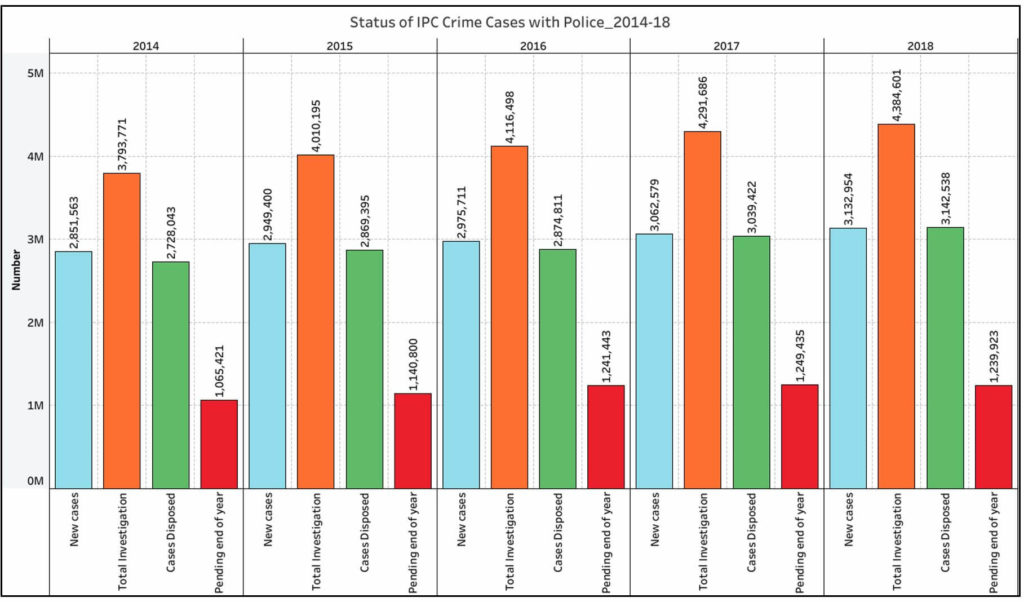
Increase in the share of IPC cases where the closure was done by police
Out of above 31.42 lakh cases under IPC that were disposed of by police in 2018, nearly 21.38 lakhs i.e. 68% of the cases were charge-sheeted and sent for trial. The remaining nearly 32% of the total IPC cases under investigation in 2018 were closed by the police and final report submitted. These 32% account for around 9.99 lakh cases.
The number of IPC cases being charge-sheeted in 2018 is less than that of previous year when in it was 21.47 lakhs. The share of the charge-sheeted cases fell from 72.87% in 2016 to 70.66% and 68.06% in 2017 & 2018 respectively.
On the other hand, the number of cases closed by the police by submitting the final report has not only increased in absolute numbers every year, but the share also increased substantially.
In 2016, police filed the final report in 7.52 lakh cases which increased to 8.87 lakhs and 9.99 lakhs in 2017 and 2018 respectively. During these three years even the share of such cases increased from 26.97% in 2016 to 29.21% and 31.82% in 2017 & 2018 respectively.
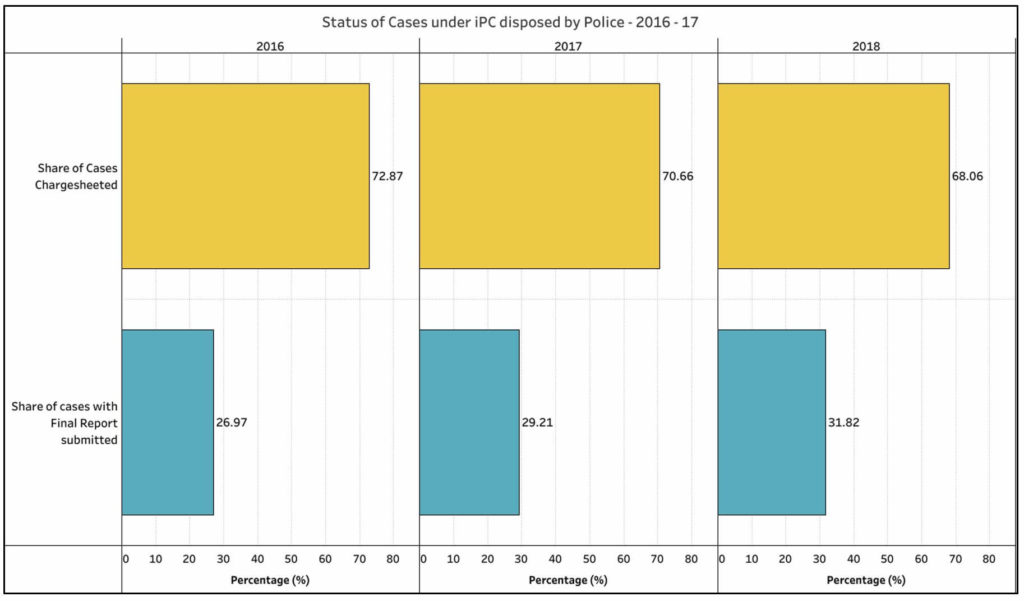
23% of the cases under IPC disposed due to insufficient or no evidence
A major portion of the IPC cases closed by police in 2018 , i.e. 7.35 lakh were closed due to ‘Cases True but Insufficient Evidence or Untraced or No Clue’. i.e. nearly 74 % of all the cases closed by the police without a trial.
Apart from being a major part of cases disposed of by the police, the ‘lack of evidence’ category also accounts for a sizeable portion (23.4%) of all the IPC cases disposed of by the police in 2018.
The share of cases disposed of by the police due to ‘lack of evidence’ has increased continuously over the last few years. This was 19.8% and 20.8% i.e. accounting to 5.7 lakh and 6.3 lakh IPC cases in 2016 and 17 respectively.
In 2018, 1.01 lakh cases were closed as False reports while 1.35 lakh cases were closed as ‘Mistake of Fact/Law/Civil Dispute’.
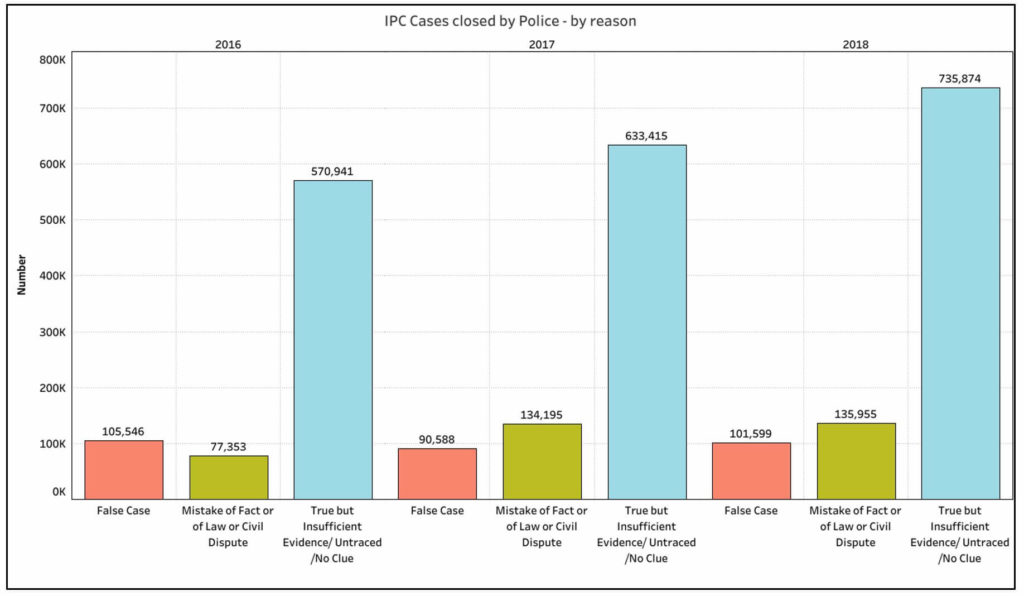
Final report filed by the Police in most cases of Theft and Robbery
The cases under various heads of IPC are concentrated at different stages of the police investigation process. When analysed with respect to different crime heads, many interesting trends were observed.
Most of the cases relating to ‘Hurt’, ‘Rash Driving’ etc are the still under police investigation.
Out of the 6.8 lakh cases which are pending under ‘Hurt’ , 4.65 lakh cases are charge-sheeted and sent for court trial, while around 1.59 lakh cases are still under investigation.
‘Rash Driving on Public Way’ is another major crime head with nearly 5.37 lakh cases of which 4.03 lakh cases are charge-sheeted and rest are pending for investigation.
Rape and Riots are other crimes where a major share is disposed of by police via charge sheeting.
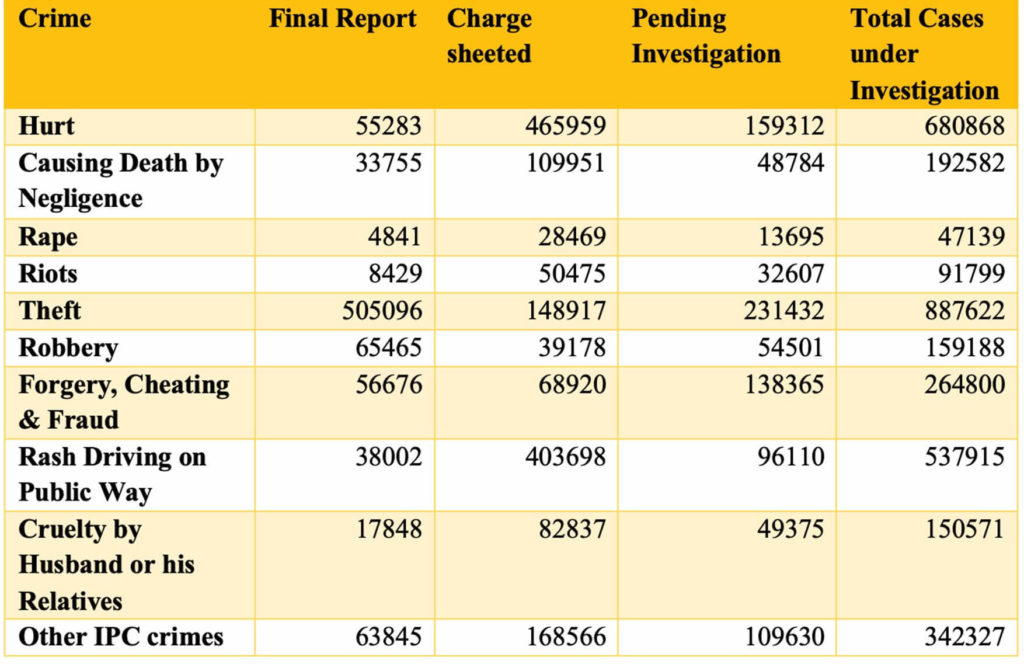
Among the cases disposed of by the police, most of the IPC crimes account for a higher share of charge-sheeted cases. The cases relating to Theft, Robbery and Fraud are exceptions.
Approximately 52% (1.38 lakh) of the cases relating to ‘Forgery, Cheating & Fraud’ are still under police investigation, the highest such share for any IPC crime head. Meanwhile, police have filed the final report in around 41% of the cases booked under ‘Robbery’ and another 34% such cases are pending investigation.
In more than half of the cases i.e. nearly 57 % of the cases booked as ‘Theft’, police have filed the final report. Majority of them are the ones without enough evidence.
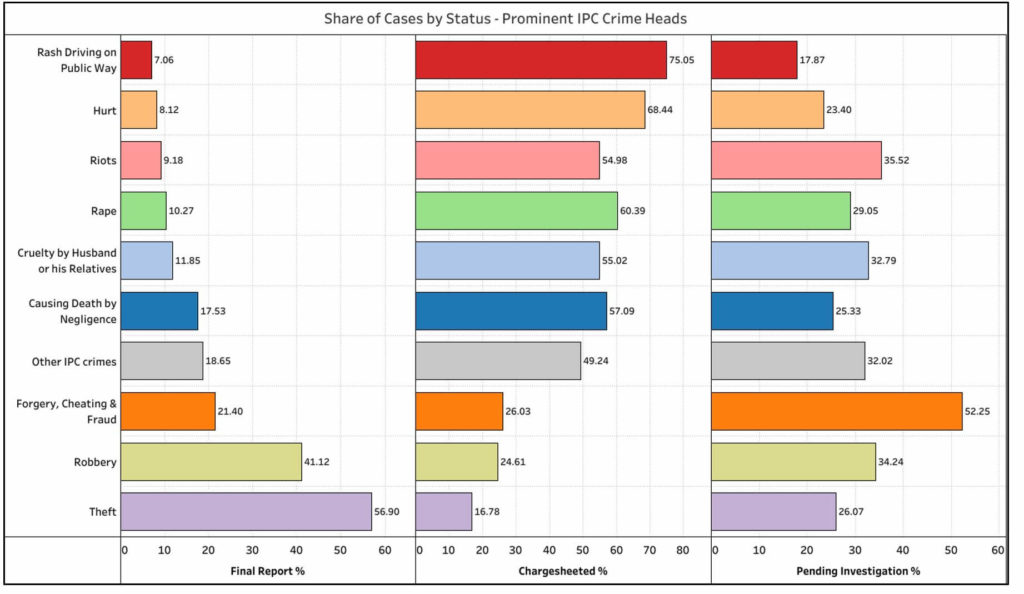
Higher disposal rate for SLL crimes in 2018 compared to previous year.
In 2018, a total of 23.72 lakh SLL (Special & Local Laws) cases were under police investigation of which 19.41 lakh cases were new cases. By the end of the year, 19.65 lakh cases were disposed by the police with 4.06 lakh cases still pending investigation. This is an improvement over the previous year when 4.3 lakh cases were pending by the end of 2017.
The total number of SLL cases reported has drastically reduced from 2016 compared to the previous years. This is because of a change in the kind of SLL cases being reported in the NCRB report.

Despite the fall in the number of cases reported under SLL since 2016, the number of pending cases were comparatively higher compared to previous years.
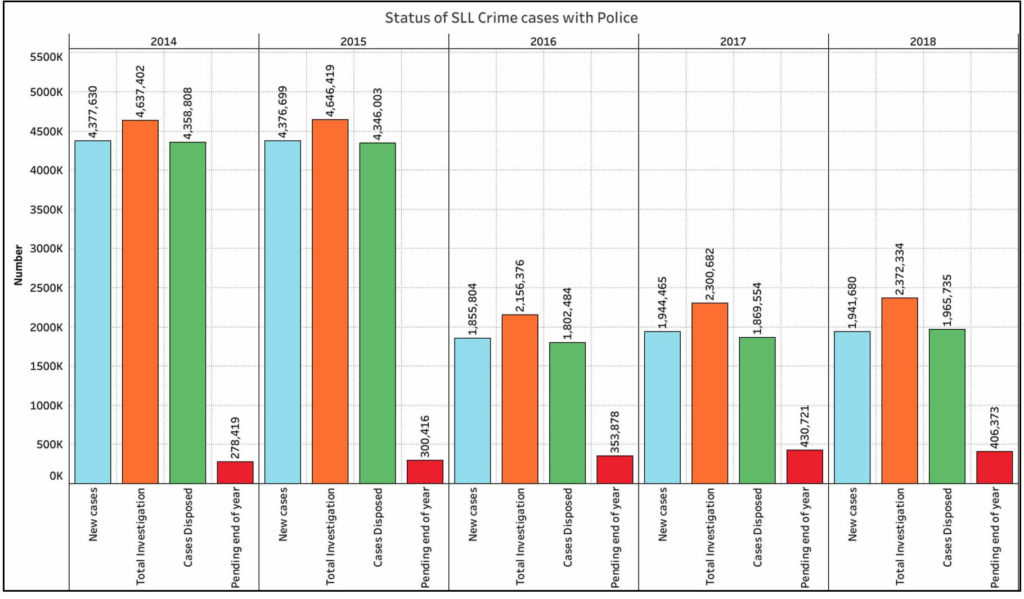
More than 90% of the SLL cases are charge sheeted every year
Among the SLL cases disposed of by police in 2018, more than 90% are charge-sheeted and sent for court trial. In 2018, out of the 19.65 lakh cases disposed of by police, 18.12 lakh cases were charge-sheeted while final report was filed in 1.46 lakh cases.
While the share of cases charge-sheeted is very high in the SLL cases, there is a gradual increase in the share of cases where the police has filed the final report. In 2016, such cases were 5.04% which increased to 6.83% and 7.44% in 2017 and 2018 respectively. A major portion of these cases was closed by the police due to lack of evidence.
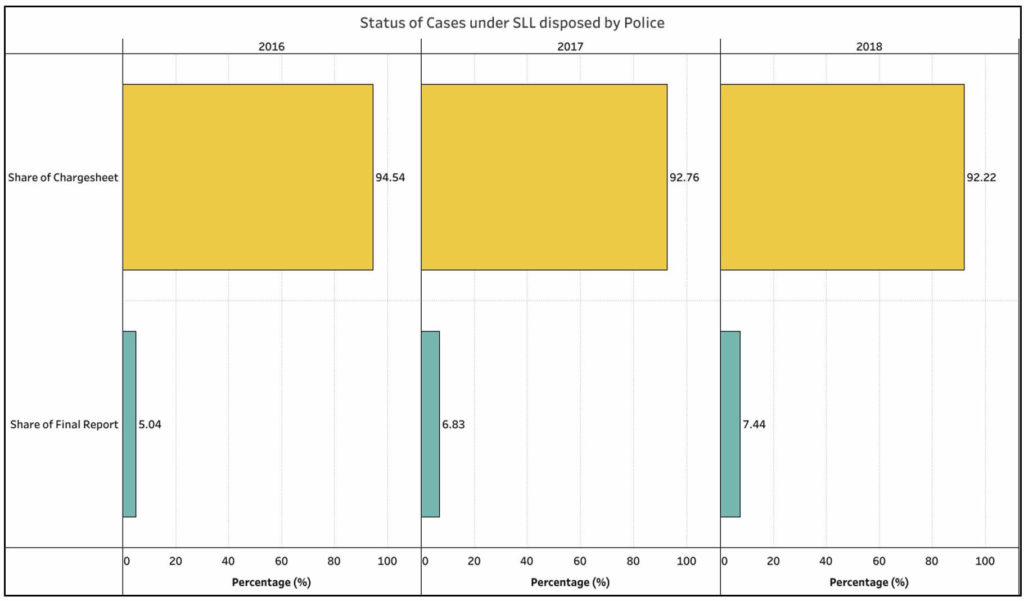
Most of the SLL cases fall under ‘Liquor and Narcotic Drugs related Acts’ and other Regulatory & Enforcement acts like ‘Gambling Act’, ‘Electricity Act’ etc.
Increase in the cases disposed of by the Police due to lack of evidence
A common trend across various crimes under IPC and SLL is the increase in the share of cases closed by the police without filing the charge sheet. As highlighted earlier, police filed the final report (without filing a charge sheet) in bulk of the cases like ‘Theft and Robbery’ because of non-availability of evidence.
A higher share of cases which cause bodily harm like accidents, riots, rape, causing death etc are charge-sheeted by the police and sent for court trial.
Closure of cases for lack of evidence points to serious issues in the investigation process and with the investigative agencies. Factors like – lack of personnel, lack of resources etc could be influencing such increasing trends.
Analysis of the NCRB data to understand what could be causing delay at various stages of police investigation would be done in part-2 of this series.
Featured Image: IPC Crime Cases


